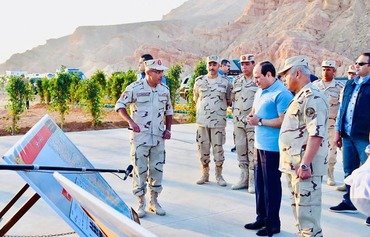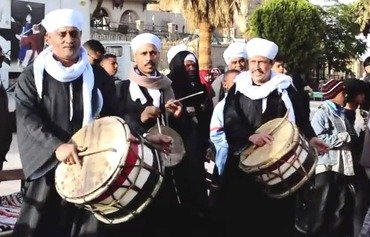Egypt's Sinai continues to suffer the economic fallout from terrorist threats and attacks, with the tourist sector the most afflicted by the current security situation, government officials tell Al-Shorfa.
The reluctance of tourists to visit the peninsula, where tourism typically peaks during Ramadan, is driven by concerns about security in areas such as Sharm el-Sheikh and al-Arish where there have been attacks, they said.
Additionally, curfews have been imposed in several areas, as the Egyptian army continues its ongoing military operations targeting "Islamic State of Iraq and the Levant" (ISIL) affiliate Wilayat Sinai.
A number of countries have banned their citizens from traveling to Egypt, and Sinai in particular, as a result of recent circumstances.
In a June 2nd statement, the Egyptian armed forces announced they had completed the third phase of Operation Martyrs' Right.
During this phase of the operation, initially launched in September 2015, the army has killed 22 militants and arrested five others, the statement said.
Egyptian armed forces also destroyed a large number of houses that armed gunmen had used as bases, disabled a number of improvised explosive devices (IEDs) and seized a quantity of weapons and ammunition, it said.
Tourism sector in a tailspin
"The terrorist threat has almost totally wiped out tourism in south Sinai areas, which are known for their tourist destinations, such as Sharm el-Sheikh, Dahab and St. Catherine," said Mahmoud al-Mohammed of the Ministry of Tourism’s chamber of tourism companies.
"The month of Ramadan this year is probably the worst the region has experienced," he told Al-Shorfa.
"Occupancy rates are at [an average] 16% at the most, with the Dahab region recording the lowest rate at 3%, with Taba at 8%, St. Catherine at 12% and Sharm el-Sheikh at 19%," he added.
Occupancy rates typically increase significantly during Ramadan, he noted, often to more than 80%, peaking in the final days of the holy month and Eid al-Fitr.
Bookings for Eid al-Fitr in years past began early, he said, and hotels sometimes reached full occupancy before Ramadan began, drawing both domestic and foreign tourists to the peninsula.
In an attempt to offset recent challenges, the Egyptian government this year launched the "Egypt is in our hearts" initiative to stimulate domestic tourism.
But while the initiative covers 700 Egyptian pounds ($78) of the expenses of each domestic tourist, paid to hotels owners, "demand has been relatively weak and not commensurate with the size of the initiative and media promotion conducted for it", al-Mohammed said.
Supporting tourism during Ramadan
Egyptian ministries are taking steps "each according to its area of specialisation" to alleviate the economic pressure on Sinai residents caused by low tourism, said Amr Mukhtar, director of the chamber of planning at the Ministry of Supply and Internal Trade.
The Ministry of Social Solidarity is working to assist families who depend primarily on tourism for their income by disbursing monthly stipends to them for a period of six months to help them get through this crisis, he told Al-Shorfa.
Meanwhile, he said, the Ministry of Supply opened several ‘Welcome Ramadan’ outlets that are selling food supplies and other requirements for the holy month at subsidised prices to help residents cope with the economic down-spiral.
There also has been strict enforcement of price control, he added, in order to ensure all consumer products are abundantly available.
"The majority of the population of the regions of Sinai are directly or indirectly dependent on the tourism sector, and their situation deteriorated as conditions in the sector worsened," Mukhtar said.
Tourism sector investors have been trying to bring investment and tourists back to the region and have been holding conferences in co-operation with the Ministry of Tourism and the Tourism Promotion Authority to this end, he said.
The Sinai regions of Taba and Nuweiba in particular are suffering from a severe decline in the number of tourists, he added, noting that these two regions were expected to receive about 4.5 million tourists in 2016.
Night curfew darkens festivities
"Sinai regions are suffering from the reluctance of tourists to visit them as a direct result of the terrorist threats," said Brig. Gen. Jawdat Ashraf of the Egyptian police, who is currently stationed in Sinai.
The security measures and the ongoing state of emergency, which are necessary to protect lives, have exacerbated Sinai residents' suffering, he said, adding that these conditions have detracted from the atmosphere of Ramadan.
Activity during the month, which typically picks up at night, is almost non-existent, he said, as it now coincides with the curfew hours.
"It is not possible from the security standpoint to reduce the curfew hours or ease the security measures during the month of Ramadan in the areas of North Sinai, for fear that would be exploited by terrorists and they would carry out attacks against citizens and security personnel alike," he said.
"Terrorist attacks intensify in the month of Ramadan specifically, because terrorists believe that fighting during this month is doubly rewarded," he added.
Economic activity, and tourism in particular, have certainly been affected by these measures, he said, "but things will gradually return to normal when the security threats abate".

![Resorts like this one in the Dahab area of Sinai have seen a drop in visitors this year as a result of security concerns. [Photo courtesy of Mahmoud al-Mohammed]](/cnmi_am/images/2016/06/21/5640-Sinai-tourism-ramadan-600_384.jpg)





